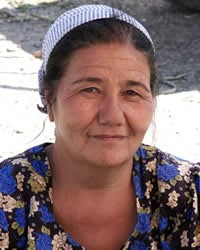Uzbek, Northern in Uzbekistan

Photo Source:
Fulvio Spada - Wikimedia
Creative Commons
|
Send Joshua Project a map of this people group.
|
| People Name: | Uzbek, Northern |
| Country: | Uzbekistan |
| 10/40 Window: | Yes |
| Population: | 30,198,000 |
| World Population: | 34,573,900 |
| Primary Language: | Uzbek, Northern |
| Primary Religion: | Islam |
| Christian Adherents: | 0.02 % |
| Evangelicals: | 0.01 % |
| Scripture: | Complete Bible |
| Ministry Resources: | Yes |
| Jesus Film: | Yes |
| Audio Recordings: | Yes |
| People Cluster: | Uzbek |
| Affinity Bloc: | Turkic Peoples |
| Progress Level: |
|
Introduction / History
The earliest ancestors of the Uzbeks, the Central Asian Turks, aided Genghis Khan in his conquest of Eastern Europe in the 1300s. Eventually, as unity between the Turks and Mongols faded, numerous warring kingdoms formed. It was from several of these kingdoms that the Uzbeks descended.The name Uzbek may mean "master of himself." Their love of freedom and a general restlessness often caused conflict with the waves of invaders who conquered the country over the centuries. The Uzbeks are descended from a mixture of mostly Turkic tribes that include some Mongolian and Iranian traits. Northern Uzbek is a major Uzbek dialect.Alexander the Great's army swept through Central Asia (the home of the Uzbeks) in the fourth century. Arabs and Turks, followed by Genghis Khan and the Mongols, overran Central Asia from the 7th to the 14th centuries. Not long after Tamerlane's conquest came the last and perhaps finest period of culture and learning to the Uzbek. Tamerlane's influence was followed by a long period of decline in the 1500s. By the time the Russians subdued the country between 1860 and the 1880s, Tajikistan had disintegrated into several warring principalities.When the Russians formed the USSR, they engulfed surrounding Turkic peoples such as the Uzbeks and Tajiks. These became some of the “Soviet Socialist Republics” that made up the USSR. They were under the bondage of the USSR until 1991. Now they are still trying to find their identity.
What Are Their Lives Like?
Although most Uzbeks still follow traditional farming and nomadic shepherd lifestyles, many who migrated to the city have become merchants or skilled craftsmen. Uzbeks are especially talented bazaar artisans, working with silver, gold, leather, and wood. They also make elaborate carpets. In Uzbekistan, one can find a diverse range of individuals, including Uzbek college professors, government employees, store owners, and more.Uzbek dwellers in urban areas generally prefer European-style clothing, but traditional Uzbek dress remains common. This includes a long turban cloth (sometimes as long as three meters or more); a slipover, long-tailed cotton shirt; baggy trousers with a wide waist and held with a drawstring; a colorful waistcoat or vest; and boots of various types. Village women wear a chadar (head shawl) made of white or bright red and white cotton floral prints; baggy trousers with calf-length shirts, or high-yoked dresses with full skirts reaching almost to the ankles.The traditional Northern Uzbek family unit is based on kinship ties. Marriage of children is most often a contractual arrangement that is sealed with a bride price, and the bride then lives with the groom's family. Marriages are celebrated with feasting, competitions, and other rituals. Women continue to do much of the household work and handle many of the less skilled and manual jobs. Because of their Muslim culture, women are often segregated from the men.
What Are Their Beliefs?
Uzbeks have been Muslims for hundreds of years, but many are secularized because of the Soviet influence. There are small numbers of Christ followers. Numbers are adding, not multiplying.
What Are Their Needs?
Uzbeks have had communism forced on them by the Russians during the days of the USSR. Many want to return to their Islamic cultural roots. They need true spiritual nourishment: Christ is real “food” and “drink.” They will not find in unless they look to him.
Prayer Points
Pray for the families and communities in this large people group to discover and embrace the truth about the prophet Isa (Jesus), about whom the Koran teaches, and whom the Bible reveals in fullness.Pray the Uzbeks would understand that Jesus desires to bless their families and neighborhoods.Pray that believers among the Uzbeks would be effective at engaging their families and communities in discussing Bible stories and experiencing God's blessing.Many younger Uzbeks are looking for a belief system to satisfy their deepest spiritual hunger. Pray for workers to sow God's word into Uzbek families, healing and strengthening households with God's blessing.